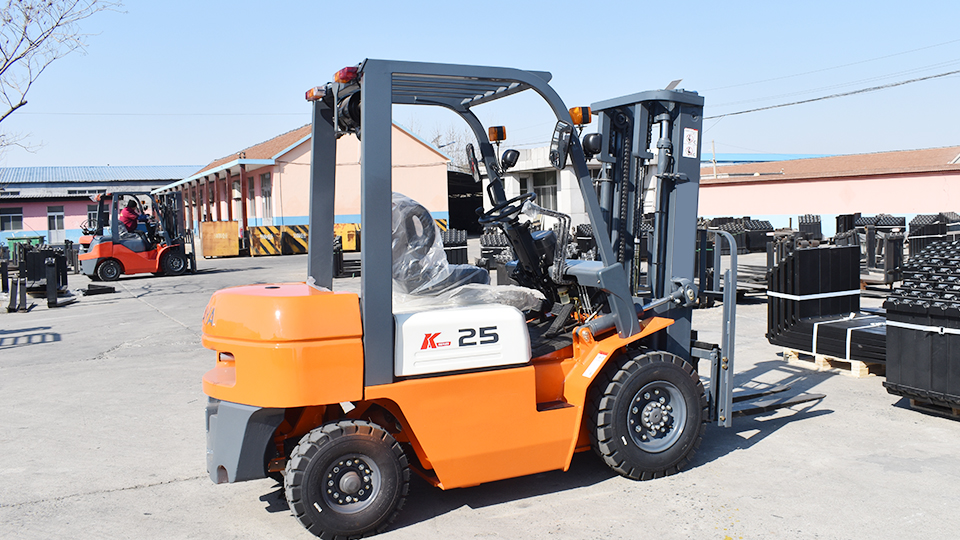
In the world of logistics, warehousing, and manufacturing, the forklift is a ubiquitous and essential tool. These powerful machines are responsible for the efficient movement of goods, and their operators are a critical component of a functional supply chain. For individuals considering a career as a forklift operator or those already in the field, a common and important question arises: "Do you get paid more for having a forklift license?"
This article will explore the tangible and intangible benefits of this certification, analyzing its impact on salary, job opportunities, career advancement, and professional value. We will examine data from various sources, including salary surveys and industry reports, to provide a comprehensive and data-driven answer to the central question.

The Mandate of Certification: Safety and Legal Compliance
Before we can discuss the financial benefits, we must first understand the fundamental reason why certification is required. The operation of a forklift is not without risk. Accidents can lead to serious injuries, fatalities, and significant property damage. Recognizing these dangers, OSHA established a strict set of regulations (29 CFR 1910.178) that require employers to ensure all powered industrial truck (forklift) operators are properly trained and certified.
This certification is not a one-time event. OSHA standards dictate that operators must be re-evaluated every three years, and refresher training is required if an operator is involved in an accident, is observed operating the forklift unsafely, or is assigned to a different type of equipment. This continuous training and evaluation process is a cornerstone of workplace safety and a non-negotiable legal requirement for employers.
The certification process itself typically involves three key steps:
Formal Instruction: This can include lectures, online training, or videos covering topics such as operating principles, vehicle stability, and safety procedures.
Practical Training: This is the hands-on portion where the operator learns to perform specific tasks under supervision, such as maneuvering, stacking, and unstacking loads.
Performance Evaluation: A final test where the operator's skills are assessed to ensure they can safely and competently operate the equipment.
For an employer, hiring a certified operator is not just a preference; it is a legal necessity. Non-compliance with OSHA standards can result in hefty fines and legal action. This regulatory framework is the primary driver of the value of a forklift certification in the job market.
The Financial Impact: A Data-Driven Analysis
The short answer to the question, "Do you get paid more for having a forklift certification?" is a definitive yes. While a non-certified individual might theoretically be hired for a general labor position that involves forklift operation, a certified operator is far more valuable and, as a result, commands a higher wage. The certification itself is a clear signal to an employer that an individual has a baseline of knowledge and has invested in their professional development.
Data from various sources, including job boards and salary surveys, consistently shows a significant pay differential between certified and non-certified operators.
Average Salary: A certified forklift operator generally earns a higher average hourly wage and annual salary compared to someone in a similar role without the certification. While the exact figures vary based on location, industry, and experience, the increase is often substantial. For example, some sources indicate that certified operators can earn an average of 15-20% more than their non-certified counterparts.
Top-End Earnings: The highest-paid forklift operators almost universally hold current and relevant certifications. Specialized skills, such as operating rough-terrain forklifts in construction or heavy-duty models in port operations, are almost exclusively held by certified professionals, and these roles offer a premium wage.
Overtime and Incentives: Employers are more likely to offer overtime opportunities and performance-based bonuses to certified operators. These individuals are seen as more reliable and efficient, and their safe work practices reduce the risk of accidents that can cause costly delays.
The reason for this pay difference is multi-faceted:
Reduced Liability: A certified operator is a lower liability risk for an employer. Their training reduces the likelihood of accidents, which in turn lowers insurance premiums and the potential for legal costs.
Increased Productivity: Proper training and certification lead to more efficient and skilled operation. Certified operators are better at handling loads, navigating tight spaces, and performing tasks quickly and accurately, thereby increasing overall productivity.
Versatility: Many certifications cover multiple classes of forklifts, making the operator more versatile and valuable to a company that uses different types of equipment.
Industry Demand: Forklift operators are in high demand across numerous sectors, including manufacturing, logistics, retail, and construction. This demand, coupled with the legal requirement for certification, creates a competitive market for skilled professionals, which drives up wages.
Beyond Salary: The Professional Benefits of Certification
While a higher paycheck is a significant motivator, the value of a forklift certification extends far beyond just salary. It is a powerful tool for career advancement and professional stability.
1. Enhanced Job Opportunities
A forklift certification is a key differentiator on a resume. When a hiring manager sees "OSHA Certified Forklift Operator," it immediately flags the candidate as qualified and ready to work. Many job postings explicitly require or strongly prefer certified applicants. This opens up a wider range of job opportunities, from entry-level positions to more advanced roles in various industries. The certification acts as a universal passport, demonstrating a baseline of skill and safety knowledge that is recognized and valued nationwide.
2. Career Advancement
The certification is often the first step on a career ladder. A certified operator who demonstrates proficiency, a strong work ethic, and a commitment to safety is a prime candidate for promotion. Many companies look for forklift operators with certifications to fill roles such as:
Forklift Supervisor: A supervisor is responsible for overseeing a team of operators and ensuring all safety and efficiency standards are met.
Warehouse Manager: A comprehensive understanding of warehouse operations, including the safe and efficient use of forklifts, is essential for this role.
Logistics Coordinator: This position requires a deep knowledge of the movement of goods, which is often centered around forklift operations.
The certification provides the foundational knowledge and credibility needed to be considered for these more senior positions, which come with significantly higher salaries and greater responsibility.
3. Professional Credibility and Job Security
In an increasingly competitive job market, professional credibility is a valuable asset. A forklift certification is a tangible piece of evidence that an individual is a skilled, responsible, and safety-conscious professional. This credibility can lead to greater job security. Employers are more likely to retain and invest in employees who have demonstrated a commitment to their craft and who help the company remain compliant with federal regulations.
Furthermore, the portable nature of the certification means that it is not tied to a single employer. If an operator decides to change jobs, their certification travels with them, making them immediately marketable to a new company. This flexibility and independence are invaluable.
The Process of Getting Certified
For those who are not yet certified, the process is relatively straightforward and a worthwhile investment. The cost of certification is a small price to pay for the potential increase in earnings and job opportunities.
Choose a Training Provider: Numerous companies offer OSHA-compliant forklift training. This can be done through an employer, a dedicated training center, or online platforms that offer a combination of virtual and in-person components.
Complete the Formal and Practical Training: The training will cover all aspects of forklift operation, from pre-shift inspections to safe load handling.

Pass the Evaluation: This involves both a written exam and a hands-on practical test to demonstrate competence.
Receive Your Certification: Upon successful completion, you will receive a certification card, which serves as your proof of qualification.
The time commitment is typically minimal, often taking a few hours to a few days, depending on the format. The return on investment, however, is long-term and significant.
Conclusion
The question of whether a forklift certification leads to higher pay is not a matter of opinion but a demonstrable fact supported by legal requirements, market demand, and salary data. A forklift certification is far more than just a piece of paper; it is a vital professional credential that unlocks a higher earning potential, a wider range of job opportunities, and a more secure career path.
For the modern forklift operator, certification is not optional. It is a fundamental necessity that ensures workplace safety and compliance. For the ambitious professional, it is a strategic investment that pays dividends in the form of a more competitive salary, career advancement, and a stable future in a critical and growing industry. The tangible and intangible benefits of being a certified operator make it a clear choice for anyone serious about a career in industrial operations.
Name: selena
Mobile:+86-13176910558
Tel:+86-0535-2090977
Whatsapp:8613181602336
Email:vip@mingyuforklift.com
Add:Xiaqiu Town, Laizhou, Yantai City, Shandong Province, China